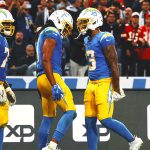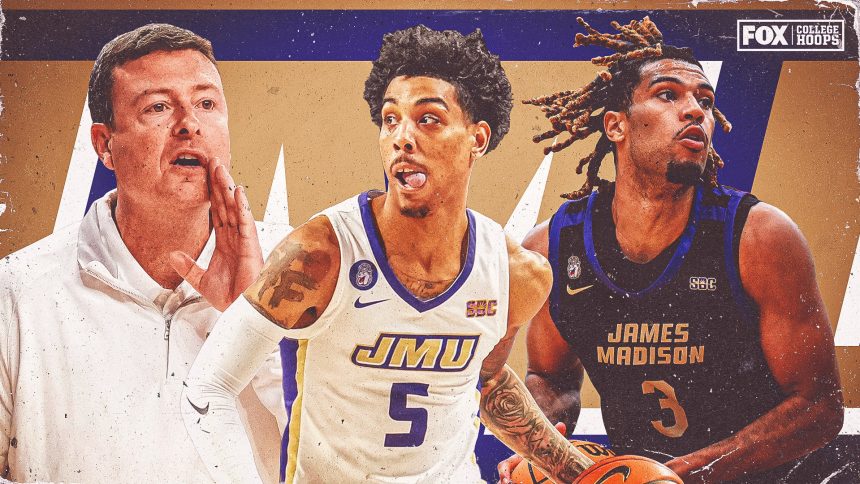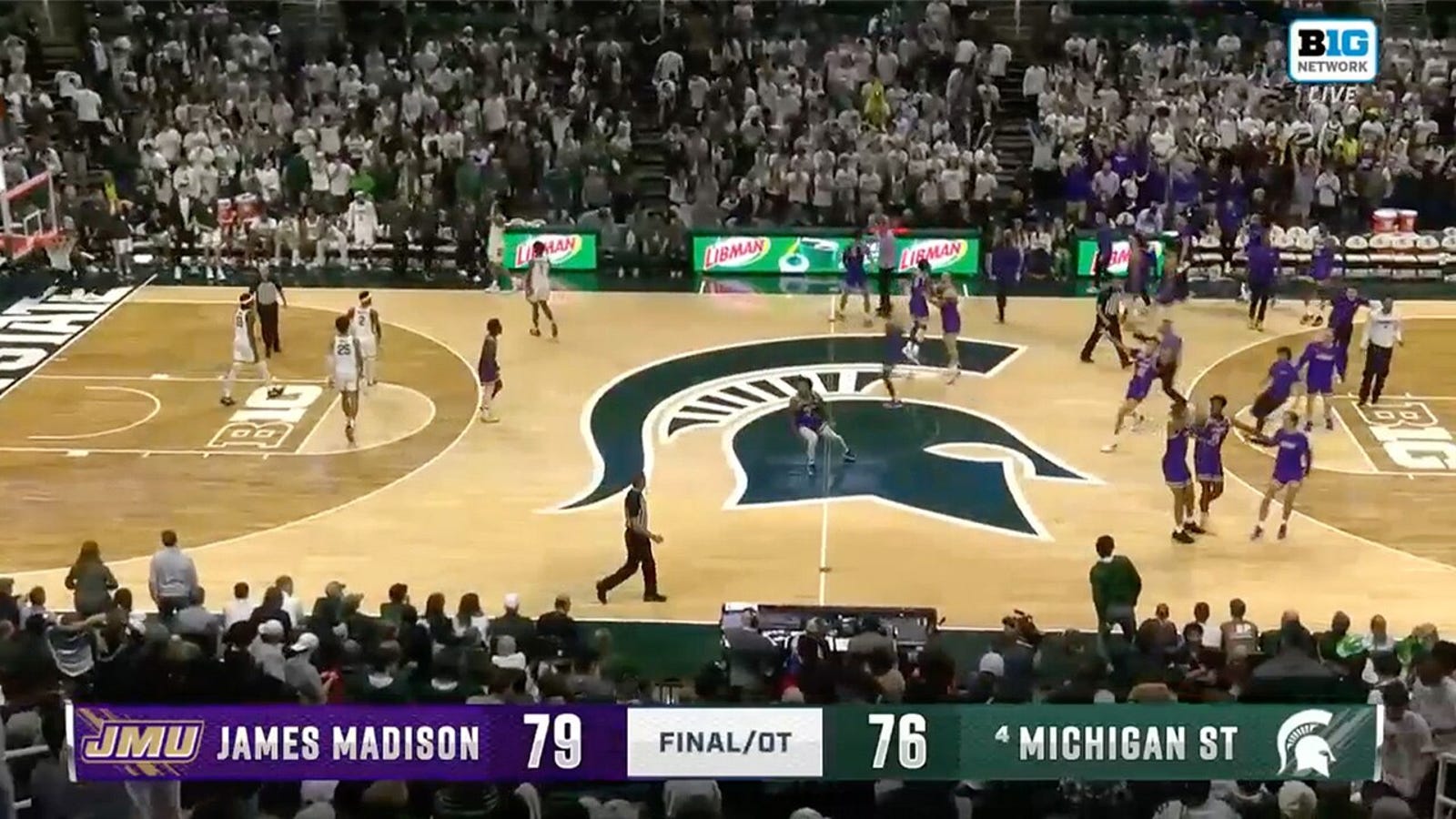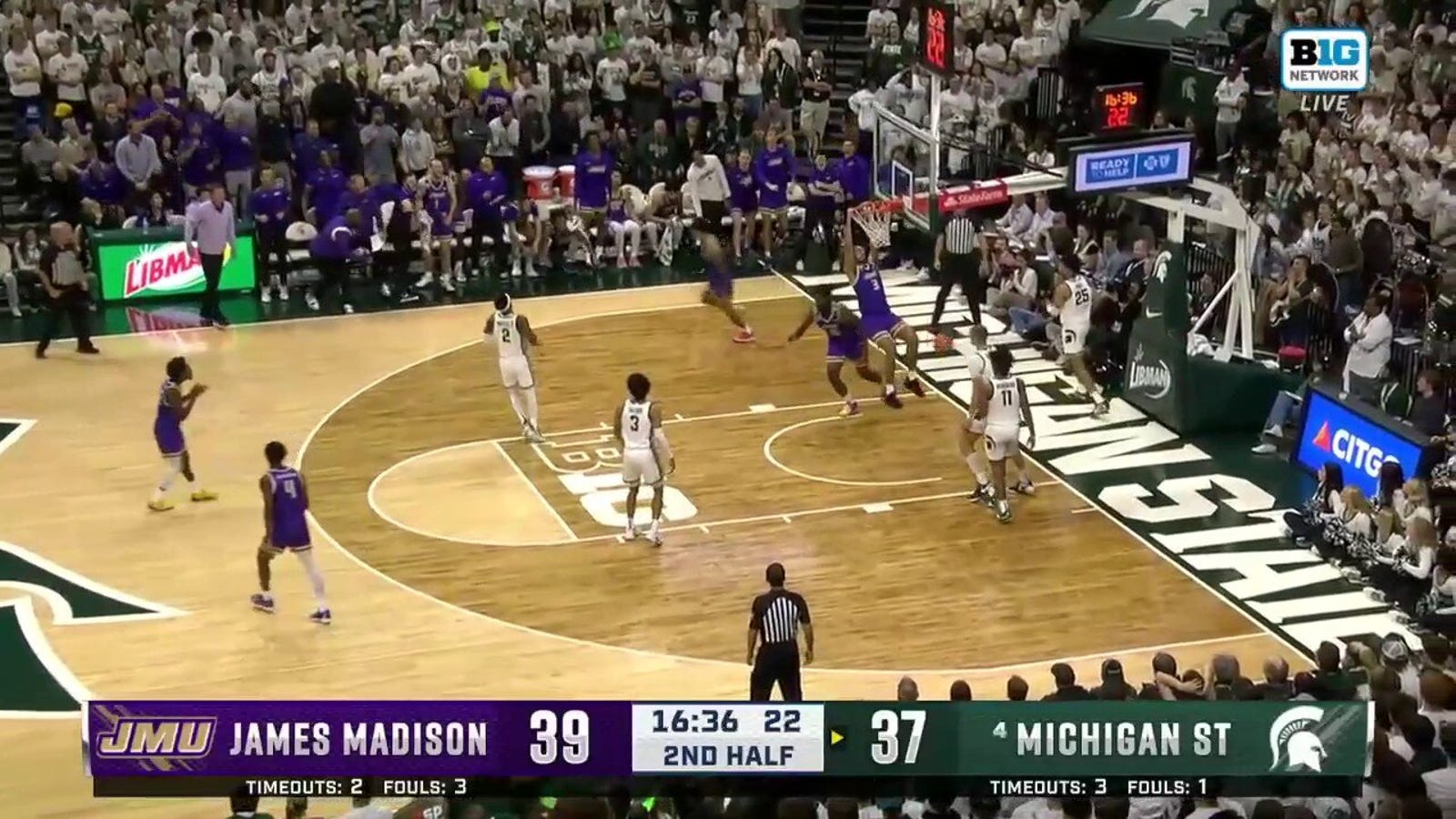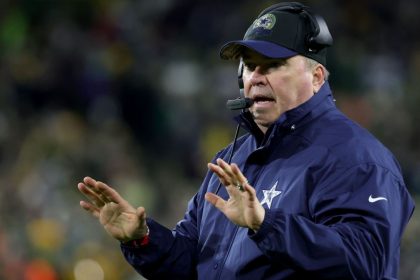Editor’s note: James Madison won the Sun Belt Conference Tournament championship on Monday and will go on to play in the NCAA Tournament for the first time since 2013. The original story is as follows.
Matt Bucklin was deep in thought in his office, pondering potential solutions for James Madison‘s men’s basketball program to find a marquee non-conference game to help boost the Dukes’ résumé. In his second year as an assistant coach at James Madison – a Division I program located in Harrisonburg, Virginia with a student population of just over 22,000 – Bucklin wanted to make a splash. The problem? There wasn’t a long list of high-major programs willing to face a quality mid-major that was the favorite in the Sun Belt Conference and was coming off its most successful season in 41 years.
“I knew we needed a buy game,” Bucklin said. “But it’s been really hard to get those here, so I was getting to the point where we needed to call someone for a favor.”
Head coach Mark Byington, who was set to begin his fourth year at the helm at James Madison, was feeling the pressure to get something done after being rejected several times by a number of programs.
ADVERTISEMENT
“Pretty much everybody in the country told us no when we were trying to schedule,” Byington said. “We would love to get on a bus and play somebody in Virginia, Maryland or North Carolina in a guarantee game. We got told no by all of them. So, we had to use a relationship. We needed to find somebody.”
Naturally, the next step was to get in touch with somebody who could assist and offer up a favor: family.
So, Bucklin called up the office of his uncle, who just so happens to be a Hall of Famer and the head coach at Michigan State – Tom Izzo. Bucklin’s mother, Mary, is one of Izzo’s two sisters, and it’s only natural that Izzo’s impact trickled into his extended family when it came to basketball and coaching. (Bucklin’s older brother, Michael, is the Senior Vice President of FOX Sports Digital.)
Izzo did not pick up his nephew’s call, but Michigan State associate athletic director Kevin Pauga did. Pauga has been at the school for 20 years and is responsible for scheduling, travel coordination and postseason planning.
Bucklin – who started his coaching career at Georgia and was on Mark Fox’s staff for an NCAA Tournament game against Izzo’s Spartans in 2015 and a charity exhibition contest in 2017 – didn’t hold back when asking Pauga, fully expecting his request to get denied: Do you think there’s any chance this could happen?
“I was 0-2 against him, well, really 0-1 with the charity exhibition game, but it’s easier to give him that game now,” Bucklin said with a laugh. “We do a get-together at [Izzo’s] beach house in late July or early August every year, and I’ve been on the receiving end of all the trash talk. So, with that in mind, I thought why not ask for the favor.”
The Spartans, regarded as a preseason national championship contender with Tyson Walker and A.J. Hoggard headlining a loaded returning cast, actually had two open dates to fill at the start of the season. Very few teams wanted to open up their season with an expected blowout loss.
“The opener was the only option for us, so we started pushing,” Bucklin said. “Our message was that this buy game would be important for our program. Ideally, this was not perfect for them for their first game, but we just kept texting him to keep this at the front of his mind.”
Bucklin paced in his office, awaiting the reply on whether it could get done. The phone rang after several days, and Pauga called with the news.
“Coach [Izzo] didn’t say no,” Pauga said.
A smile came to Bucklin’s face. A contract was drawn up in East Lansing and emailed over.
Michigan State vs. James Madison was happening, and on the opening night of the 2023-24 college basketball season, it was instantly considered one of the most intriguing games on an otherwise uninspiring slate.
Izzo visited with his nephew on Nov. 5, the night before the game, as some of Bucklin’s family were staying at the Hall of Fame coach’s house. What happened 24 hours later was the greatest regular-season moment in James Madison men’s basketball history, and a total nightmare for the home team.
The Dukes beat the Spartans, 79-76, notching the program’s highest-ranked victory ever while becoming the first program to hand an AP preseason top-five team a loss in their home opener since 2001. It marked just the second time in program history that James Madison defeated a ranked opponent, with the first coming back in 1992 in a victory over a Jason Kidd-led California team. On the flip side, Michigan State suffered its first home loss in November since the 1986-87 season.
How did Izzo, the three-time Big Ten Coach of the Year who performed the favor, handle the postgame scene with his nephew and extended family?
“I really didn’t know what to say,” Bucklin said. “He said, ‘Congratulations, I love you,’ in the postgame, and then I got a really nice postgame message that said, ‘Hey, all I want you to do is celebrate this. You don’t have to feel any other way.’
“He was happy for me, our team and our family. I was obviously emotional. On one hand, I’ve never wanted Michigan State to lose … ever. That was my third time rooting against them, and to come out on the winning side was awesome.”
That night served as a launching point for the Dukes, who followed up the victory with a 113-108 double-overtime win at Kent State three nights later. Trailing by five points with just 3.8 seconds left in regulation, Noah Freidel buried a triple and then made a game-tying layup after an offensive foul to force bonus basketball, leading JMU to an improbable win.
Overcoming a late Michigan State lead in East Lansing? Coming back to beat Kent State after trailing by five with under four seconds remaining? When you start the season winning that way, it offers a taste of March and a belief that can quickly turn into momentum.
Little did the Dukes know that their run was only beginning. Byington’s team improved to 14-0 on Jan. 4 following a 68-61 win at Louisiana, snapping the Ragin’ Cajuns’ home-winning streak at 19 games. The Dukes, who were ranked as high as No. 19 in AP Top 25 Poll, became the first team in college basketball to reach 14 wins on the season, joining Houston and Ole Miss as the three unbeatens at that time.
The Dukes were off to the best start in program history and two months into the season, they were the talk of the college basketball world.
*** *** ***
When Byington took over at James Madison in 2020 after spending the previous seven years at Georgia Southern, the program was coming off a 9-21 season, which included a last place finish in the Coastal Athletic Association.
Jeff Bourne, who is retiring this spring after a 25-year run as the university’s director of athletics, was looking for someone to take the program out of the darkness after firing Louis Rowe. What was the AD looking for in his next leader? “A players’ coach who also understood how he could maximize James Madison University,” Bourne said, “and we found that and everything more with Mark.
“It’s easy to see how much our guys enjoy playing for him. He fights for all of the things our players want, and he’s what you look for in a head coach because he gets it. He’s really enjoyable to work with, and he’s done a great job of recruiting and restoring back talent that will ultimately help us be successful long term.”
Bourne, who drank the best bottle of wine in his house the night the Dukes shocked Michigan State, said the win over the Spartans validated to the fans what he already knew: “That we hit the jackpot when we hired Mark.”
When looking at how Byington went about building his program, look no further than Terrence Edwards Jr., who is a rare four-year player at a mid-major school. The 6-foot-6 wing is averaging 17.6 points, 4.3 rebounds and 3.3 assists per game while shooting 43% from the floor and 36% from 3-point range. Edwards led the program to a seven-win improvement last year with 22 victories, the best season in terms of wins in over four decades.
“I had friends from his Georgia Southern teams that told me how much he developed guys,” Edwards said of Byington when asked why he chose James Madison coming out of Tucker High School in Georgia. “It was a no-brainer for me, and it’s never been on my mind to leave or transfer. It’s the development. These guys help you out in basketball and the real world.”
Edwards has increased his scoring production every season, as well as his assist totals, but it’s the way the school has helped him beyond basketball that has played a large role in him calling James Madison his home for four years.
“I saw all of that with this program and it became clear to me that I could never leave these guys,” Edwards said. “I want to become a pro from James Madison, not somewhere else. The people here care about you as a person, and they help you grow up. If I went somewhere else, I know I wouldn’t be where I’m at as a player and person right now.”
With an adjusted tempo that ranks 52nd in the country out of 362 teams, James Madison plays freely, something Edwards noted when describing how enjoyable it is to play for Byington. That quick tempo is sprung by the way the Dukes guard, currently ranking among the top 50 teams in the country in defensive efficiency, according to KenPom.
“I know if we put in the work, he’s going to let us be us when we’re on the floor,” Edwards added.
While Byington has enjoyed building his program with players who have stayed with the Dukes from the start of their college careers, he has also taken in transfers, including T.J. Bickerstaff, a fifth-year senior who came from Boston College. After serving in a limited role for the Eagles during a rough 16-17 campaign, Bickerstaff has found greener pastures in Harrisonburg. The 6-9 Bickerstaff has gone from 5.2 points per game to 13.9 points this season, to go along with 8.4 rebounds per contest.
“It was between going pro or coming back to college for me,” Bickerstaff said of his mindset following his fourth year of college hoops. “I knew [assistant] coach [Jon] Cremins and I knew Coach Byington from my high school days. They had watched me play before. But for me, I took time to watch film. I watched the team at the beginning of the year and then at the end of the year. The people that took the shots at the start of the year, those shots were the same at the end. I really liked the play style as well. There was a consistency to it. That made me think it was best to be here.”
T.J. Bickerstaff throws down a dunk after Terrence Edwards Jr.’s beautiful pass to extend JMU’s lead vs. Michigan State
What has made Bickerstaff’s season at James Madison the best of his college career?
“This place is special,” Bickerstaff said. “It’s the people, our mindset, the skill sets on our team. It’s a lot of things that go into it. We’ve got the right coaching staff and the right players that fit that coaching staff. It’s gelled from the start. That chemistry is different from other programs. I think this group, as a result, can accomplish anything we want to. A Sun Belt championship, an NCAA Tournament run – it’s all possible for our team.”
The way that Byington has gone about creating chemistry among his players is far from traditional – the Dukes don’t have team rules.
“Instead of rules, we lay out the expectations,” Byington said. “We start every year by breaking down what we want to do and where we want to go. A lot of things in our program are just repeated daily that we want to believe in. We want to care about each other. We want to be happy for somebody else’s success. We want to prepare as hard as we can and play as hard as we can, and give ourselves the best chance to win.
“But it’s not like we go into the locker room and say, ‘Alright, men, we’ve got 20 team rules and you’ve got to follow and abide by these.’ The number one thing is simple: recruit the right guys that care about winning. When they put that number one and care about each other, good things have a chance to happen.”
While Byington’s approach has worked, it is hard to materialize in a college basketball climate featuring close to 2,000 transfers in the portal this past offseason. So, how does Byington go about recruiting?
“It’s basically like speed dating,” he said with a smile. “It’s a lot harder to try to figure out what someone’s like. The transfer happens and you and them have to make a quick decision. NIL and playing time are involved, and yes, it’s difficult. But we always try to find guys that have an attribute of toughness. Toughness is a skill. If they don’t have that, they better have other elite skills. We love our guys to have a feel for the game because that allows us to play quick, positionless basketball. When you’re able to have guys that have a great toughness and feel for the game, it starts there.”
“The guys that we have, they’re here for the right reasons,” Bucklin added. “Our guys prioritize winning and that allowed us to come out hot. We’ve been really fortunate that they’ve come out with that mentality.”
There’s a balance between that winning mentality on the court and a healthy lifestyle off the floor, which was made evident by the players and coaches around the program, but it hasn’t always been that way for Byington. In fact, the 47-year-old who started his coaching career as an assistant at Charleston in 2002, then a brief stop at Virginia, then back to Charleston, said he hit a mental wall at one point in his career.
“I got caught up and was really unhealthy because everything about coaching was results-based,” Byington said. “I was all about competitiveness and I had to find a way to be competitive. I was absolutely miserable when we lost. And then, when you win, you don’t even feel the right way. You’re on to the next thing, being fearful of losing. As I’ve gotten older, I’ve thought of taking on challenges and seeing how we can handle them, and how we can advance. For me, it’s about building a team as one. I don’t put everything on wins and losses anymore.”
Byington holds a saying from future Pro Football Hall of Famer Bill Belicick close to his heart, and has hung it up on his office wall:
“It’s not just about what you want to achieve, but who you must become in the process.”
“When I got the job at Georgia Southern, I didn’t know if I was going to win a game,” said Byington, who took over a program that had gone 14-19 and had not appeared in an NCAA Tournament since 1992. “But I told myself, ‘If I don’t think we’re going to win, we won’t win any.’ I had to find joy in the process and focus on getting people better.”
*** *** ***
It is one thing to have success at a school. It’s another to feel support.
“Everything is big-time here,” Byington said of James Madison. “Everybody tries to say they’re in big-time leagues or big-time schools. But come here and look at our place. Academics are top-notch. Facilities are the best. I’ve worked at two different ACC schools and when I got here and saw everything, I did not see a difference. I know budgets may be different, but when you look around here, all of our sports are successful. It’s a committed place and we have everything.”
It’s no coincidence that James Madison’s football team also enjoyed a successful season, going 11-1 in the regular season, the most wins ever recorded by a program transitioning from the football championship subdivision. Head coach Curt Cignetti was rewarded for his work, being named the head coach at Indiana University in November.
“It was a circus around here,” Byington said of the excitement around the campus when football was rolling and basketball shocked Michigan State. “Every time you turned on the TV, you saw JMU. I’m sure we’ll continue to see the benefits of that. I’m glad stories are being told about JMU that would not be told if sports were not having success.”
Will there be more stories told about James Madison this March? That is the question, as the Dukes currently sit at 28-3 overall, which marks the highest win total in program history. Following a 4-3 stretch in January, JMU won 10 straight games to close out the regular season, finishing with a 15-3 mark in conference play, good for second place in the Sun Belt Conference. The winner of the regular-season title, Appalachian State, represents the biggest mountain that the Dukes have to climb in order to hear their name called on Selection Sunday. The Mountaineers have handed JMU two of its three losses this season, with a potential third meeting coming in the Sun Belt Tournament finals if both make it there on March 11 in Pensacola, Florida.
“We’ve got to just keep pushing and pushing,” Byington said. “Are we talented enough to do something special? We are, absolutely. Is our league talented enough to knock us off quickly? Absolutely. We’ve got to make the most of every single day and night, because if you look too far ahead, you’ll lose your way in the here and now.”
James Madison has been to the NCAA Tournament just once since 1994, with a First Four appearance in 2013 that led to a win in Dayton. If JMU is to make it this year, a more manageable 13- or 14-seed would likely be in the cards, based on tournament projections.
The NCAA Tournament is a time for stories to be written, and for a Cinderella tale to be born. Coincidentally, James Madison, standing at 5-4 and 100 pounds, was the smallest president in U.S. history.
March is all about David beating Goliath, right?
If the Dukes do make the Big Dance and are able to make some noise, it wouldn’t be a shock because of the experience they possess, the way they defend and the superstar they have in Edwards. Going 26-3 in the regular season and then likely having to win the conference tournament in order to get a slot in the NCAA Tournament is a hard reality.
What would it mean to the university if James Madison did make it? Bourne, who has led the athletic department for a quarter-century, summed it up perfectly.
“It would be an amazing achievement that these guys have worked toward for a long time, and a fitting achievement for this team because they play so together,” Bourne said. “For our school, the best way to reach people and elevate name-brand and recognition is through the NCAA Tournament. It would be a dream for me personally to go out as an AD on a tournament trip, and there would not be a more vocal fan than me in the seats for Mark and his kids.
“If we’re in it, we will have earned it. And then, with the group we have, just about anything is possible.”
Madison Madness in the making? Only time will tell. But the ingredients are there for a special journey, one that all started with a family reunion in East Lansing back in November, and a culture made stronger by a coach who has built his team his way.
John Fanta is a national college basketball broadcaster and writer for FOX Sports. He covers the sport in a variety of capacities, from calling games on FS1 to serving as lead host on the BIG EAST Digital Network to providing commentary on The Field of 68 Media Network. Follow him on X at @John_Fanta.
recommended
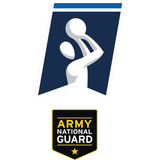
Get more from College Basketball Follow your favorites to get information about games, news and more

